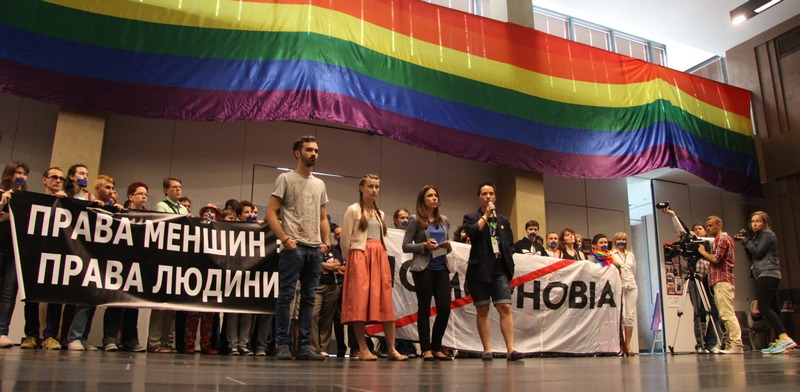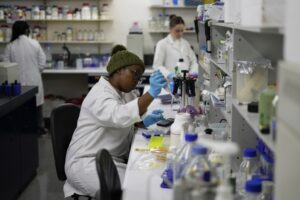Two years after Maidan, has Ukraine forgotten about LGBT reform?

he 2014 Equality Festival in Kiev. Picture by EsWerUA.

The Equality Festival, a two-day celebration to promote tolerance and equality for social groups in the western city of Lviv, Ukraine, should have taken place in mid-March. The week of the festival, the venue that the organizers had booked pulled out, worried about anonymous threats and lack of support from the city’s mayor. A local court banned the event. On what was supposed to be the first day of the festival, 200 right-wing protesters surrounded the hotel where attendees had gathered, threatening them and throwing rocks. The LGBT activists were forced to flee the city.
The events in Lviv are a sobering reminder that despite the progressive undercurrent of the 2014 Euromaidan Revolution, LGBT reform in Ukraine remains stagnant. Under the pro-European leadership of Ukrainian President Petro Poroshenko, the country has seen some positive social changes. In November, the Ukrainian parliament introduced an amendment to the Labor Code that banned discrimination in the workplace and for the first time targets unfair treatment of employees based on sexual orientation and gender identity. A few younger members of parliament, like Svetlana Zalishchuk and Sergei Leschenko, now publicly advocate for LGBT rights, and Ukrainian civil society continues to grow a support network of advocacy organizations, including one LGBT shelter. But even so, progress is slow and indirect for the country’s LGBT community.
Maxim Eristavi, a journalist and co-founder of the Ukrainian TV network Hromadske International, is one of the few openly gay public figures in Ukraine. “In a country of 45 million people you don’t know almost anyone who’s openly gay,” he says. “And if you know them, probably they’re LGBT rights activists.”
Two years after Maidan, stigmas and institutionalized homophobia remain intact, shutting down any dialogue about sexual orientation and gender identity. Ukrainian politicians, eager to appeal to Western powers and improve their country’s geopolitical position, continue to deliver rhetorical support for LGBT rights that fails to materialize into actual reform. Ukrainian President Petro Poroshenko tweeted in defense of Kyiv Pride and wrote about his country’s fight for “European values” in a Wall Street Journal op-ed last summer. But despite its groundbreaking façade, the November 2015 anti-discrimination initiative he spearheaded was only introduced in response to EU requirements for a visa-free regime. And after the passage of the amendment, he said that the legislation “had nothing to do with issues of family and marriage and concerned only working relations.”
The lack of a legal framework tackling LGBT issues also hinders the work of activists advocating for a fairer system. “[I]n court, you won’t be able to protect rights,” says Olena Shevchenko, the executive director of Insight, the LGBT nonprofit that organized the Equality Festival. “We still don’t have any mechanisms.” Despite the recent amendment to the Labor Code, “when we want to hold the festival, we face such a high level of threats, and nobody wants to do anything,” she says. All 32 of the security firms Shevchenko tried to hire to protect those involved in the festival from harassment and intimidation declined her offer, saying that they were incapable of shielding the festival attendees from the “huge force” of right-wing groups in Lviv.
Only after Insight managed to reach the national police headquarters in Kyiv did any local forces arrive on the scene. “The problem is that changes should be from both levels—society and government should work on it,” Shevchenko says. Government officials often use the topic of LGBT reform for fear mongering purposes and some politicians, like recently appointed Prime Minister Volodymyr Groysman, continue to publicly issue homophobic remarks. “I hear some fake information which says that there may be same-sex marriages in Ukraine,” Groysman said when the anti-discrimination legislation was passed. “God forbid, this will ever happen. We will never support this.”
Ukrainian society appears not only resistant to LGBT reform, but to improving civil rights in general. Following Maidan, priorities were set on cleaning up the intensely corrupt Ukrainian government and mitigating the economic burdens that followed the revolution. This backdrop caused enormous setbacks for civil rights, which were not viewed as a priority in the face of governmental and economic collapse. In 2015, Ukraine’s economy declined by almost 10 percent and last March, the IMF threatened to rescind a $17.3 billion bailout—Prime Minister Arseniy Yatsenyuk had just narrowly survived a vote of no-confidence by parliament after Poroshenko urged him to resign. What’s more, the ongoing war in the Donbass provides an excuse to ignore LGBT reform.
So far, only pressure from the West has brought real LGBT reform to Ukraine. The Association Agreement, which Poroshenko signed in 2014 and continues to support, is steering Ukraine’s adoption of EU norms in trade and politics. In many cases, international groups finance Ukrainian NGOs— Insight has Swedish financiers and Dutch funding bought the office of Nash Mir, a nonprofit devoted to LGBT issues.
Many Ukrainians like Eristavi feel frustrated by the slow pace of change—and by the inherent conservatism in the government. Two years after the revolution, they feel that they live in a country still fighting for basic civil rights. “Our government told us the situation is very difficult [and they]have very limited resources,” says Andrii Kravchuk, the leading advocacy expert at Nash Mir. “But many, many reforms can be done without additional resources. Everything that you need to change the situation is just political will.”
War with Russia is more than just an excuse for the lack of LGBT reform—it is encouraging homophobia in Ukraine. According to a 2014 report released by Nash Mir, members of the LGBT community in Russian-occupied territories of Ukraine face oppression, hate crimes, and sexual harassment. Many victims are adding to the swelling number of the internally displaced people moving West.
Rising animosity towards the LGBT community, activists say, is a result of the legal vacuum since the revolution. Outside of the war zone, “the problem lies not within the war, but within the lack of rule of law within the country after the revolution,” Eristavi says. Officially, Ukraine continues its campaign to develop “European values,” but homophobic sentiment prevails, especially within the conservative confines of the military ranks. In addition to the official Ukrainian troops, about 15,000 pro-Ukrainian volunteers currently fight in self-proclaimed battalions. These militias, often affiliated with far-right and neo-Nazi groups, easily escape the control and monitoring of the Ukrainian government. This was seen in June 2015, when members of the Right Sector, an ultra-nationalist group with its own paramilitary wing, attacked the Kyiv Pride March for Equality, to “stop those who hate the family, break morals, and destroy morality and the traditional concepts of humankind.”
Once battalion veterans return home after fighting, “they can dictate whatever they want to see in ‘their’ city,” Shevchenko says. “They’re above the law, or they are the law.”
Losing faith in a system they cannot trust, some members of Ukraine’s LGBT community are taking extra-legal measures to ensure that their voices are heard and needs satisfied. Even though same-sex marriage is not legal in Ukraine, two gay men recently defied the law by organizing an alternative “commitment ceremony.” The Ukrainian newspaper Kyiv Post reported that while Tymur Levchuk and Zoryan Kis hope to be officially recognized by the state as a married couple one day, they simply could not wait to formalize their union.
For many activists and members of the LGBT community, the inability to get married remains a particular source of indignation. “People tell me, ‘Well, we’re not against this issue, but let’s wait 20, 30 years,’” Eristavi said. “I cannot wait 30 years to have a normal life.”
Natasha Bluth is a Masters Candidate at NYU in Journalism and Russian and Slavic Studies. She is also a graduate research assistant at the Jordan Center for the Advanced Study of Russia at NYU and a 2015 graduate of Brown University. Her work focuses on LGBT, feminist issues and memory politics in post-Soviet states.




